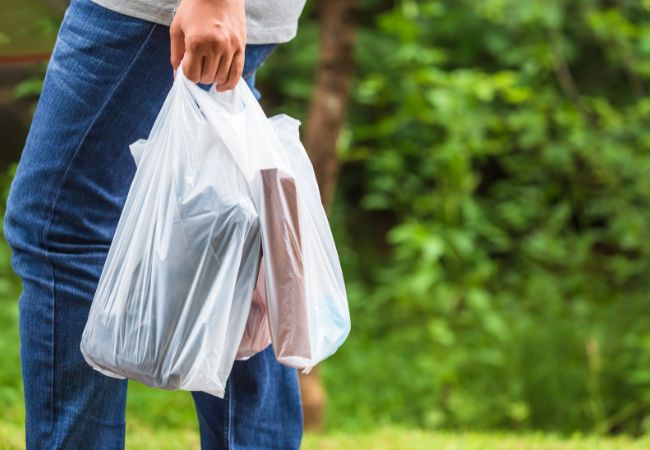Plastic bags have become an integral part of our daily lives, offering convenience and practicality for carrying groceries, goods, and personal belongings. As a leading carrier bag company in the UK, we recognise the importance of understanding the advantages and disadvantages of plastic bags, their recyclability, the efficacy of charging for them, and their potential for reuse. In this article, we delve into these aspects, shedding light on the true nature of plastic bags and their impact on the environment.
What are plastic bags?
Plastic bags are lightweight, flexible containers made from various types of polymers, typically polyethylene (PE). They come in different shapes and sizes, ranging from traditional single-use bags to thicker, reusable versions. Plastic bags are widely used for packaging and transportation purposes, providing a convenient means to carry groceries, clothing, and everyday items.
What are the advantages and disadvantages of plastic bags?
Advantages:
• Durability: Plastic bags are known for their strength and resistance to tearing, ensuring safe transportation of items
• Waterproof: Plastic bags offer protection against moisture and can safeguard items from accidental spills
• Cost-effectiveness: Plastic bags are generally inexpensive to produce, making them a popular choice for retailers
• Hygiene: Plastic bags can help prevent contamination, particularly for perishable items like meat and produce
Disadvantages:
• Environmental impact: Plastic bags have gained attention due to their contribution to pollution, including littering and harm to marine life
• Non-biodegradable: Traditional plastic bags can persist in the environment for hundreds of years, leading to long-term pollution
• Resource consumption: Manufacturing plastic bags requires significant amounts of non-renewable resources, such as petroleum and natural gas
• Single-use culture: Disposable plastic bags can promote a throwaway mentality and discourage the adoption of more sustainable alternatives
Can plastic bags be recycled?
Yes, plastic bags can be recycled, but it requires a specialised recycling process. Many supermarkets and recycling centres provide collection points for plastic bag recycling. However, it is essential to note that not all plastic bags are recyclable. Thin, single-use bags are often made from low-density polyethylene (LDPE), while thicker, reusable bags are usually made from high-density polyethylene (HDPE). The recycling symbol with the number 4 indicates that a bag is LDPE and suitable for recycling. To ensure proper recycling, it is recommended to check with local recycling facilities for specific guidelines.
Does charging for plastic bags work?
The introduction of the plastic bag charge in the UK has shown promising results in reducing plastic bag consumption and encouraging consumers to switch to reusable alternatives. According to research conducted by the UK government, the number of plastic bags distributed by large retailers fell by over 95% following the implementation of the 5p bag charge. This demonstrates that charging for plastic bags has a positive impact on reducing waste and encouraging positive behaviour change.
Are plastic bags strong enough to be reused?
While single-use plastic bags may not be designed for long-term reuse, thicker, reusable plastic bags are specifically engineered to withstand multiple uses. These bags are often made from stronger materials, such as HDPE or woven polypropylene (PP), and feature reinforced handles and seams for added durability. With proper care and responsible use, these reusable bags can serve as an eco-friendly alternative to single-use bags, reducing waste and environmental impact.
In conclusion, plastic bags have both advantages and disadvantages, and their environmental impact has prompted a global call for action. As a carrier bag company committed to sustainability, we acknowledge the need for responsible plastic bag usage, recycling, and the promotion of reusable alternatives. By understanding the lifecycle of plastic bags, supporting recycling initiatives, and encouraging the adoption of durable, reusable bags, we can collectively work towards a more environmentally conscious future.
At Carrier Bag Shop, we ensure that our plastic bags have biodegradable qualities, therefore, making them eco-friendly. We have a wide range of sizes and colours to choose from. You can also brand them with your own logo. Visit our website to find out more.
Sources:
- UK Government: Plastic bag charge: retailers’ responsibilities (https://www.gov.uk/guidance/carrier-bag-charges-retailers-responsibilities)
- Recycle Now: Plastic Bags (https://www.recyclenow.com/what-to-do-with/plastic-bags-0)
Related articles
Why do UK supermarkets use paper bags instead of plastic
The changing face of plastic bags: BBC Radio 5 Live interview


